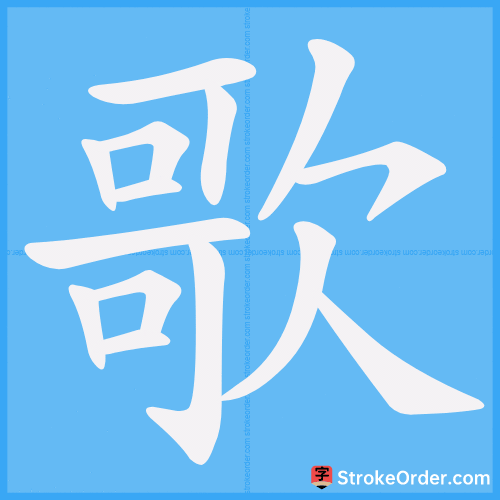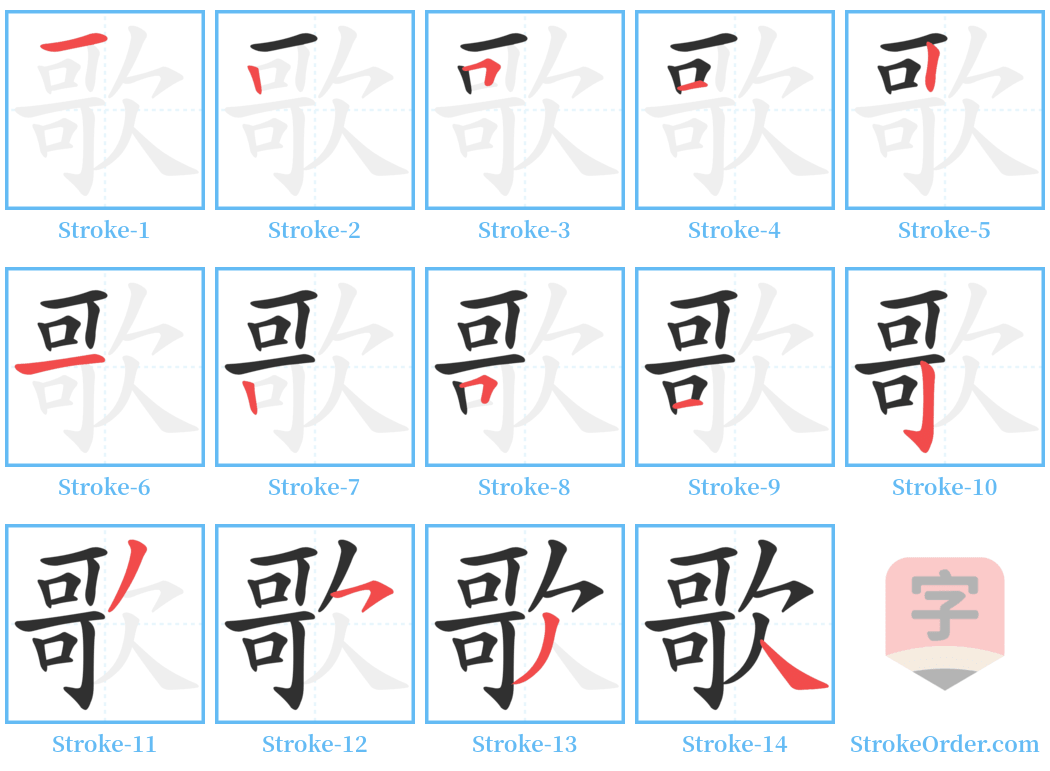歌 Stroke Order
Animated Stroke Order of 歌

Stroke Order Diagrams for 歌

Step-by-Step Handwriting Guide for 歌

Learn to Write Chinese Characters with Video Tutorials
Watch the video of writing the Chinese character "歌", learn the correct stroke order (笔顺) of the character "歌", and master the standard way of writing the character "歌".
Free Printable Handwriting Practice with Stroke Order: 歌
Printable Writing Practice Worksheet of "歌" in Portrait Orientation (Tian Zi Ge)

Printable Writing Practice Worksheet of "歌" in Landscape Orientation (Tian Zi Ge)

Information of 歌
Pinyin
gē
Radical
欠
Strokes
14 strokes
Usage
★★★★★
Definition
song
歌
gē
【Verb】
1. 唱 (sing)
- Example: 对歌 (sing responsively)
- Example: 高歌 (sing loudly)
- Example: 歌吹 (sing and play)
- Example: 歌鼓 (sing and drum)
- Example: 歌戏 (sing in a playful manner)
2. 歌颂,赞美 (sing the praises of)
- Example: 歌功 (praise someone's merits)
- Example: 歌思 (sing in longing)
- Example: 歌叹 (sing and express admiration)
3. 奏乐;伴奏 (play music)
- Example: 歌于斯,哭于斯 (sing here, weep here)
4. 又指禽鸟鸣叫 (chirp, as in birds)
- Example: 鸟歌花舞太守醉 (birds sing and flowers dance, the official is drunk)
5. 作歌;作诗 (to compose songs or poetry)
- Example: 歌以讯止 (composed a song to stop)
【Noun】
1. 歌曲;歌词 (song)
- Example: 校歌 (school song)
- Example: 民歌 (folk song)
- Example: 国歌 (national anthem)
- Example: 歌头曲尾 (a format of singing poetry and prose)
- Example: 歌味 (flavor of the song)
- Example: 歌儿 (song)
- Example: 歌章 (song chapter)
2. 诗体的一种 (a kind of poetry)
- Example: 《长恨歌》 (The Song of Everlasting Regret)
- Example: 歌行 (a type of poetic form)
- Example: 歌诗 (lyric poetry with musical notation)
3. 古用同“哥” (ancient usage also meaning "brother" or "father")
- Example: 歌歌 (used as “哥哥” or "older brother")
Input Method for 歌
Pinyin
ge1
Wubi
sksw
Cangjie
mrno
Zhengma
aijr
Four Corner
17682
Unicode
U+6b4c
Same Pronunciation Characters